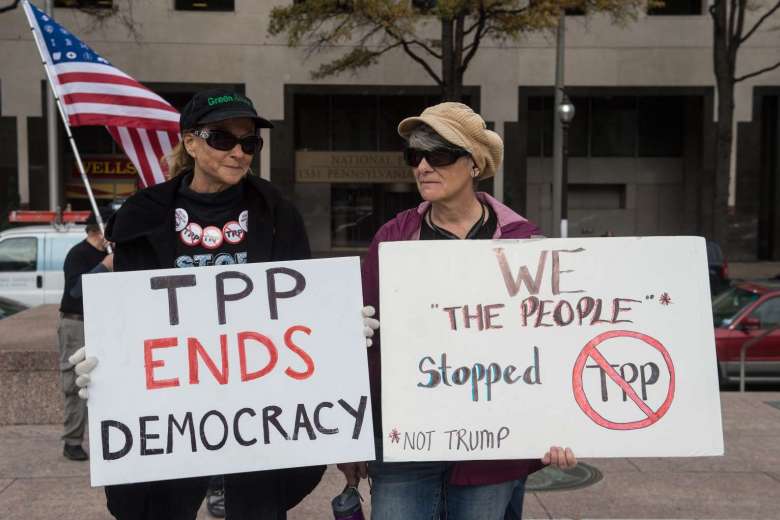As Trump kills TPP, China eyes December talks to fill trade void

Bloomberg | November 23, 2016
As Trump kills TPP, China eyes December talks to fill trade void
Even before Donald Trump enters the White House and formally abandons a U.S.-led trade deal that represented a cornerstone of his country’s economic policy in Asia, Chinese President Xi Jinping will get a chance to prove his willingness to step into the leadership vacuum.
The U.S. withdrawal from the 12-nation Trans-Pacific Partnership — reaffirmed by Trump in a videotaped speech Monday — has focused attention on a competing set of trade talks planned for Indonesia next week. The negotiations, which unlike TPP include China and not the U.S., aim to synchronize existing pacts across much of Asia and would cover 30 percent of the global economy and almost half the world’s population.
The proposed Regional Comprehensive Economic Partnership, or RCEP, has become the next best hope for trade-hungry Asian nations after Trump’s surprise presidential win signaled a shift toward more protectionist policies in the U.S. Securing a deal would help cement China’s role as a geopolitical leader and further enmesh the world’s second-largest economy in the region.
“Unless the U.S. steps up its economic game, all the countries of this region will be pulled into the orbit of China economically,” said Kishore Mahbubani, a former diplomat and now dean of the Lee Kuan Yew School of Public Policy at the National University of Singapore. “As long as China becomes the economic center of gravity, its political influence will grow.”
The next round of RCEP talks will be held in Bumi Serpong Damai city, near Jakarta, from Dec. 2 to Dec. 10. Unlike TPP, which was sold by U.S. President Barack Obama, Japanese Prime Minister Shinzo Abe and other proponents as the prototype for a new generation of trade deals, RCEP doesn’t try to impose higher standards in areas such as labor and environmental protection. The 16-member pact would level tariffs and rules governing the region’s complicated supply chains, while improving market access and introducing dispute-resolution mechanisms.
The talks would amalgamate agreements already hashed out between the 10-member Association of Southeast Asian Nations and Australia, China, India, Japan, South Korea and New Zealand. China is the largest trading partner for most of the participants, a distinction it achieved with South Korea in 2003, Japan in 2005, India in 2008 and Asean in 2009.
While free-trade advocates argue the two deals would compliment rather than conflict with each other, RCEP talks had taken a backseat as Obama promoted the TPP as a way to keep China from writing the rules of the global economy. Trump’s Democratic opponent, Hillary Clinton, had also opposed the TPP, but many expected the former secretary of state to revisit it in some form if she won the election.
Trump pledged to act on day one of his scheduled Jan. 20 inauguration to withdraw the U.S. from the TPP, which he called a “potential disaster for our country.” He said he would pursue two-way trade deals instead.
Expand Cooperation
Xi, meanwhile, reaffirmed China’s commitment to trade and said deals such as RCEP would help integrate his country into the global economy. “We should deepen and expand cooperation in our region,” he said while attending the Asia-Pacific Economic Cooperation summit last weekend in Lima, Peru.
In talks in the Philippines just days before the U.S. election, ministers from RCEP nations issued a statement that “underscored the urgency” of reaching a deal due to the “soft outlook for world trade growth and increasing protectionist sentiment.” Indonesian Finance Minister Sri Mulyani Indrawati said Wednesday her main concern amid volatile markets was weakness in global trade.
‘Major Challenge’
“Over the last ten years, it is clear that international trade is continuing on a declining trend that has affected countries like China, India and of course Indonesia, especially due to our reliance on natural resources,” she said in a speech at the stock exchange. “Weakening trade, which has been a main driver for global growth, poses a major challenge."
Getting an agreement would be significant win for China, said Jayant Menon, lead economist for trade and regional cooperation at the Asian Development Bank. “China will be seen as having secured the biggest deal in the world.”
Progress on RCEP may advance other talks, such as a stalled effort for a three-way trade deal between China, Japan and South Korea, said Toshiki Takahashi, a senior researcher at the Institute for International Trade and Investment in Tokyo. RCEP “could be used as leverage.”
Huge obstacles remain. The TPP took seven years of negotiations before its signing in February. RCEP, which has been under discussion for three years, is complicated by special provisions to give countries such as Cambodia and Myanmar more time to bring tariffs into line. India’s push to liberalize its services sector by negotiating access for globe-trotting professionals is another sticking point.
“The fact that it involves countries at different economic development levels already complicates the process,” said Kim Young-man, director of the East Asia free trade agreement team at South Korea’s trade ministry. “We’ll have to try our best to get it done within the next year. But then again, it’s hard to predict.”





